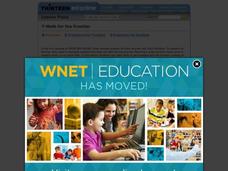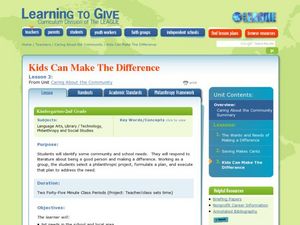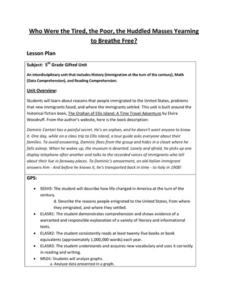Curated OER
Comparing Fiction and Nonfiction
Fifth graders compare and contrast an informational article with a fictional story. They read the story "The Contest" as a class, and discuss the different types of literature genres. Next, they complete a vocabulary worksheet and a...
Curated OER
Family Life: merit badge
In this family life worksheet, students use their workbook to answer short answer questions about family life and relationships. Students complete 7 questions total to get their merit badge.
Curated OER
Family Member
For this worksheet on family members, students describe what is meant by family, their duty to family, and family meetings. In addition, they create a budget for their family for one month keeping track of all expenses for 7 days....
Curated OER
Bringing Attention to Autism Awareness Month
A short description of Autism Awareness Month and a few fun activities to engage your autistic learners.
Environmental Protection Agency (EPA)
The Case of the Mysterious Renters
Upper-elementary kids examine the water usage in their own home, then use that data to solve a case in which a landlady is trying to determine how many people are living in an apartment being rented. Combine math, scientific method, and...
Curated OER
Bank Loans Money to Start Businesses
After locating Latin American countries on a world map, children read about how microbanks are loaning money to help start small businesses. Involving both current events and economics, the teacher introduces the article with a map...
Curated OER
Math for the Frontier
Make history come to life by using the Frontier House series to engage students in the past. Your class will "prepare" for a trip to 1833 Montana. They will learn about homesteading, frontier life, inflation, and cost of living. Using...
Curated OER
F.L.A.S.H. Introduction
F.L.A.S.H stands for Family Life and Sexual Health, it's a program specifically focused on providing special needs learners with vital information regarding personal and sexual health. This is an overview of the program, complete with...
Curated OER
Kids Can Make a Difference
What is a philanthropist? We can all be philanthropists! After assessing the needs of the school and listening to literature about how they can help others, primary learners develop a class project and maintain a journal of their...
Curated OER
Alexander Used to Be Rich
Reading Alexander, Who Used to Be Rich Last Sunday, launches this lesson appropriate for children who recognize coins and have been introduced to coin values. Using addition and subtraction skills, the class tracks Alexander’s spending...
C.S. Lewis Foundation
Study Guide to The Four Loves
This well-designed, and easy-to-understand study guide is a goldmine in understanding the ideas and philosophies of C.S. Lewis’s The Four Loves. The resource easily breaks down the four loves (affectionate, friendship, romantic, and...
Curated OER
Celebrate Library Card Sign-Up Month
Motivate your class to acquire and utilize a library card all year long.
Fun Music Company
Substitute Lesson Ideas For The Music Teacher
Have to sub for a music class on short notice? Or have some extra time to play with? Never fear! Help is here in the form of 20 sure-fire music activities and worksheets tested and submitted by music teachers. A great resource to add to...
Northeast Georgia Regional Educational Service Agency
Who Were the Tired, the Poor, the Huddled Masses Yearning to Breathe Free?
Elvira Woodruff's The Orphan of Ellis Island: A Time Travel Adventure is the core text in a interdisciplinary unit study of immigration at the turn of the century.
Crafting Freedom
Harriet Jabocs and Elizabeth Keckly: The Material and Emotional Realities of Childhood in Slavery
Learning how to make accurate inferences by putting together facts found in multiple sources is one of those skills all learners must develop, but one that can be a challenge to teach. This resource is a must-have for your curriculum...
Crafting Freedom
Harriet Jabocs and Elizabeth Keckly: The Material and Emotional Realities of Childhood in Slavery
Through the journals written by Harriet Jacobs and Elizabeth Keckly, young readers gain insight into the lives of two enslaved children on nineteenth-century plantations.

















